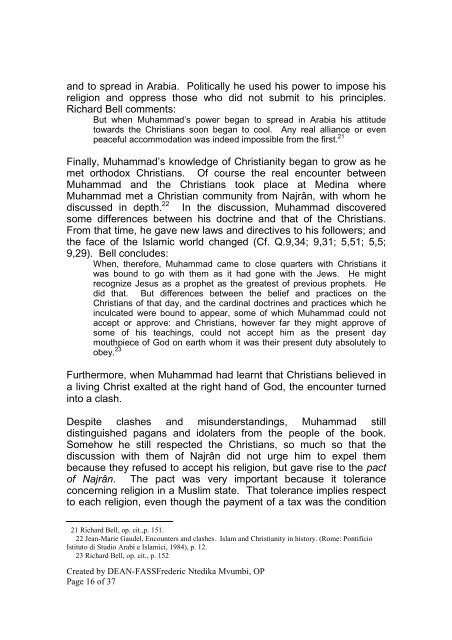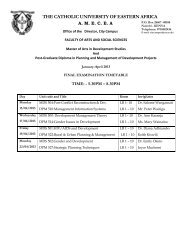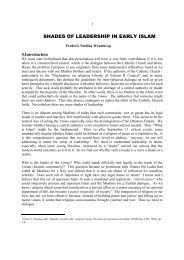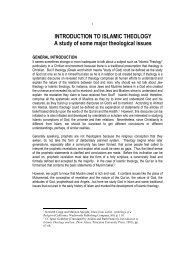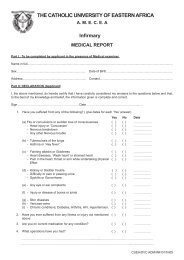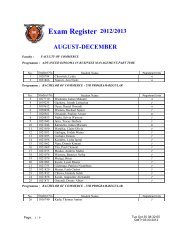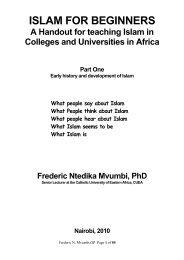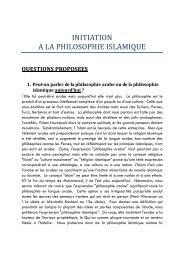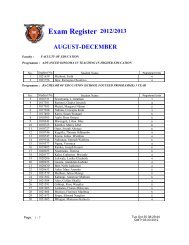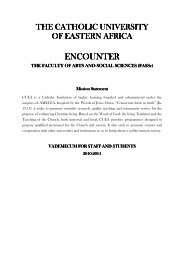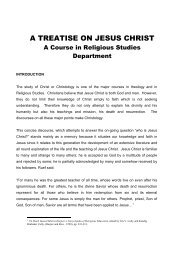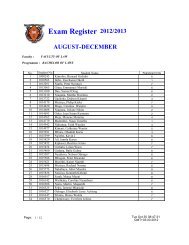PRINCIPLES FOR INTERRELIGIOUS DIALOGUE.pdf - CUEA
PRINCIPLES FOR INTERRELIGIOUS DIALOGUE.pdf - CUEA
PRINCIPLES FOR INTERRELIGIOUS DIALOGUE.pdf - CUEA
Create successful ePaper yourself
Turn your PDF publications into a flip-book with our unique Google optimized e-Paper software.
and to spread in Arabia. Politically he used his power to impose his<br />
religion and oppress those who did not submit to his principles.<br />
Richard Bell comments:<br />
But when Muhammad’s power began to spread in Arabia his attitude<br />
towards the Christians soon began to cool. Any real alliance or even<br />
peaceful accommodation was indeed impossible from the first. 21<br />
Finally, Muhammad’s knowledge of Christianity began to grow as he<br />
met orthodox Christians. Of course the real encounter between<br />
Muhammad and the Christians took place at Medina where<br />
Muhammad met a Christian community from Najrân, with whom he<br />
discussed in depth. 22 In the discussion, Muhammad discovered<br />
some differences between his doctrine and that of the Christians.<br />
From that time, he gave new laws and directives to his followers; and<br />
the face of the Islamic world changed (Cf. Q.9,34; 9,31; 5,51; 5,5;<br />
9,29). Bell concludes:<br />
When, therefore, Muhammad came to close quarters with Christians it<br />
was bound to go with them as it had gone with the Jews. He might<br />
recognize Jesus as a prophet as the greatest of previous prophets. He<br />
did that. But differences between the belief and practices on the<br />
Christians of that day, and the cardinal doctrines and practices which he<br />
inculcated were bound to appear, some of which Muhammad could not<br />
accept or approve: and Christians, however far they might approve of<br />
some of his teachings, could not accept him as the present day<br />
mouthpiece of God on earth whom it was their present duty absolutely to<br />
obey. 23<br />
Furthermore, when Muhammad had learnt that Christians believed in<br />
a living Christ exalted at the right hand of God, the encounter turned<br />
into a clash.<br />
Despite clashes and misunderstandings, Muhammad still<br />
distinguished pagans and idolaters from the people of the book.<br />
Somehow he still respected the Christians, so much so that the<br />
discussion with them of Najrân did not urge him to expel them<br />
because they refused to accept his religion, but gave rise to the pact<br />
of Najrân. The pact was very important because it tolerance<br />
concerning religion in a Muslim state. That tolerance implies respect<br />
to each religion, even though the payment of a tax was the condition<br />
21 Richard Bell, op. cit.,p. 151.<br />
22 Jean-Marie Gaudel, Encounters and clashes. Islam and Christianity in history. (Rome: Pontificio<br />
Istituto di Studio Arabi e Islamici, 1984), p. 12.<br />
23 Richard Bell, op. cit., p. 152 .<br />
Created by DEAN-FASSFrederic Ntedika Mvumbi, OP<br />
Page 16 of 37


